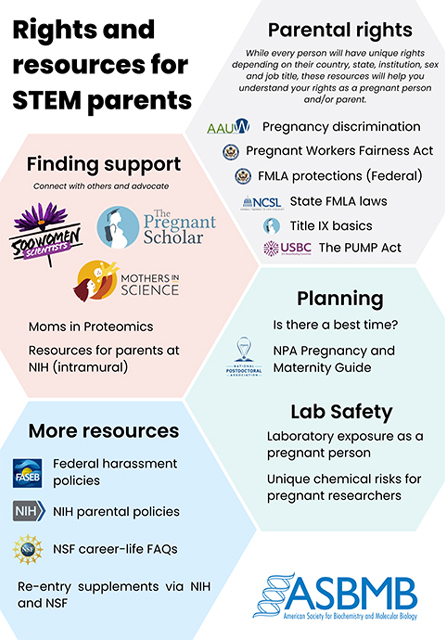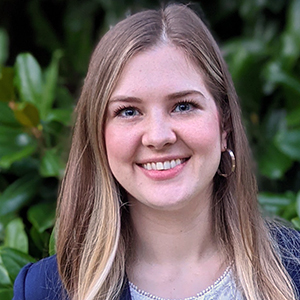STEM parents call for culture and policy change
“We all face this key scientist’s dilemma: Can we be a parent, a caregiver, a partner, a friend AND a scientist?”
Monica Malta, an assistant professor at the University of Toronto, articulated this question during a LinkedIn chat hosted by the American Society for Biochemistry and Molecular Biology to discuss the systemic challenges faced by parents and caregivers working in science, technology, engineering and mathematics.
As a solo parent, Malta said, she almost left her academic career. After taking unpaid maternity leave, she didn’t think she could return to her field. “But against all odds, I’m still here,” she said. “Three kiddos after.”
Malta described the uphill climb that she and many of her colleagues face: “Mothers in STEM face discrimination, drops in productivity and inequities in wages and promotion — all of which contribute to this huge drop in the full-time STEM workforce.”
The career path from bachelor’s degree to tenure-track faculty includes low pay, long hours and, often, frequent moves, so raising young children is difficult without financial or caregiving support.
As a result, mothers are almost twice as likely as fathers to leave academia when they’re postdocs and three times less likely than women without children to obtain a tenure-track position.
Ahana Maitra is a postdoctoral fellow at Fiocruz Amazônia. “There is growing evidence … showing that systemic barriers related to motherhood are driving the major leak in the STEM pipeline,” she said, “but this problem has been ignored forever.”
This year, Congress took a first step to help pregnant and caregiving parents in STEM. They passed a provision in the CHIPS and Science Act that directs the White House Office of Science and Technology to advise federal science agencies on implementing caregiving flexibility and support across all career stages.
Additionally, after letting it sit stagnant for a decade, lawmakers finally passed the Pregnant Workers Fairness Act in December as one of two amendments in the fiscal 2023 omnibus bill to help pregnant workers in the U.S. The amendments require employers to provide reasonable accommodations during pregnancy and childbirth as well as more time and space for breastfeeding.
Organizing and speaking out
Most research institutions and federal science agencies offer little support to help parents of young children navigate STEM careers, resulting in significant barriers to striking a successful balance. No standard policies or best practices ensure equitable and adequate support for parents at all career stages in academia. The support a parent receives varies depending on their circumstance, gender, employment status, institution, state and country.
A comparison of the 2017 and 2021 National Postdoctoral Association Institutional Policy Reports shows a more than 20% increase in the number of surveyed institutions offering paid maternity leave to postdoc employees. While this progress is encouraging, more than a third of institutions still lack paid maternity leave and have a reduced amount of support for postdocs who are not employees of their institution (those funded by training grants, research fellowships or other external funding sources).
In a letter to the National Institutes of Health in 2019, Postdoc Parents for Change asked for federal policy changes for postdocs including (1) at least eight weeks of paid parental leave and four additional weeks for birthing parents, (2) extended fellowships and grants to account for family leave, (3) transitional support back to work, and (4) assistance with affordable childcare.
The NIH agreed that many policies were insufficient but did not offer concrete solutions at first other than to “initiate discussions to address the concerns.” (You can read the full letter and NIH’s response here.) The NIH then issued a one-year childbirth extension for K99/R00 awards and an incremental improvement that allows a $2,500 childcare cost allowance per budget period for National Research Service Award fellowship or training grants.
Maitra is a member of Mothers in Science, an international nonprofit founded in 2019 that has brought together thousands of STEM students and professionals around the world to raise awareness of systemic structural barriers that silently push mothers away from STEM career paths. Their fast-growing community has developed a wealth of resources, research and advocacy to support and elevate the needs of STEM parents.

Rights and resources for STEM parents
Browse curated information on your rights, finding support and navigating pregnancy and parenthood in academia in this resource guide.
Malta belongs to the grassroots organization 500 Women Scientists, which began its SciMom Journey campaign, also in 2019, to bring more visibility to mothers in science, share their stories and advocate for improved policymaking. In response to the COVID-19 pandemic, they developed concrete recommendations to help supervisors, employers and universities minimize career penalties for parents in STEM fields; they advocated for extensions for tenure or promotion, creative workplace/teaching accommodations and supportive, flexible professional environments.
More than policymaking
Institutional policies are not the only things hurting STEM parents. Cultural stigma also can cause mothers and fathers to feel they can’t be both an attentive parent and a successful scientist.
At the ASBMB LinkedIn chat, scientists railed against the idea that being a parent is a weakness or career barrier.
Maitra said she faced discrimination when she tried to gain access to career opportunities, such as conferences or important meetings or research projects. At times, she said, she was told bluntly that it was more important to take care of her kid first rather than dedicate herself to her career. “These experiences affected my chances to gain more visibility as a researcher,” she said, “and I missed several chances for collaboration.”
Malta urges institutional leaders and employers “to confront cultural beliefs that STEM professionals with caregiving responsibilities are less valuable, less committed to their careers and less productive than their colleagues without these responsibilities.”
She also calls on leaders to listen to parents in STEM, especially those experiencing additional layers of discrimination, such as those directed toward racial, ethnic and LGBTQIA+ minorities, and work with them to brainstorm solutions and tailored strategies that work for them.
Unique challenges
There may not be a one-size-fits-all solution. Parents belonging to groups that historically have been marginalized in STEM are affected in unique and intersectional ways that stem from cultural and personal perceptions. A 2017 report from the Pregnant Scholar showed that white postdocs are more likely to have supportive advisors and to ask for and receive parental leave than postdocs of color.
Toni Mosley, a Black woman, a mother and a program manager for 500 Women Scientists’ Fellowship for the Future, said she battled mental health challenges. “Black women are expected to do it all not only by society but by ourselves as well,” she said. “When I found myself struggling to juggle my responsibilities, I realized I couldn’t meet my own expectations. I didn’t know how to ask for help, because I was afraid of looking weak, which caused my work and my mental health to suffer.”
When Mosley finally reached out for support, she said, she received a simple piece of advice: “Never lose sight of your goals, but be realistic and forgiving.” This empowered her to be flexible with some of her goals and timelines so she could begin to relax and enjoy being both a mom and a STEM professional.
Malta and the other scientists in the chat agreed that a supportive environment was key to their retention. In Malta’s case, a lack of support pushed her to switch to an organization that was more welcoming.
And she continued her “scientist’s dilemma” comments with a sobering admission: “Of course it is NOT easy to be a mother and continue working in STEM. ... I won’t lie: It is hard.”
If you have more ideas on how federal agencies and institutions can support parents in STEM, contact the public affairs team at publicaffairs@asbmb.org.
Enjoy reading ASBMB Today?
Become a member to receive the print edition four times a year and the digital edition monthly.
Learn moreFeatured jobs
from the ASBMB career center
Get the latest from ASBMB Today
Enter your email address, and we’ll send you a weekly email with recent articles, interviews and more.
Latest in Careers
Careers highlights or most popular articles

Decoding how bacteria flip host’s molecular switches
Kim Orth will receive the Earl and Thressa Stadtman Distinguished Scientists Award at the ASBMB Annual Meeting, March 7–10, just outside of Washington, D.C.

Defining JNKs: Targets for drug discovery
Roger Davis will receive the Bert and Natalie Vallee Award in Biomedical Science at the ASBMB Annual Meeting, March 7–10, just outside of Washington, D.C.

Upcoming opportunities
No matter where you are in your career and what future path you aspire to, everyone needs leadership skills. Join ASBMB for practical strategies for building and practicing leadership skills.

Close out ASBMB 2026 with a bang
The closing reception of the 2026 ASBMB Annual Meeting will be held at the Torpedo Factory Art Center in Alexandra, Virginia.

Redefining lipid biology from droplets to ferroptosis
James Olzmann will receive the ASBMB Avanti Award in Lipids at the ASBMB Annual Meeting, March 7–10, just outside of Washington, D.C.

Creating change in biochemistry education
Pamela Mertz will receive the ASBMB William C. Rose Award for Exemplary Contributions to Education at the ASBMB Annual Meeting, March 7-10 in Washington, D.C.


